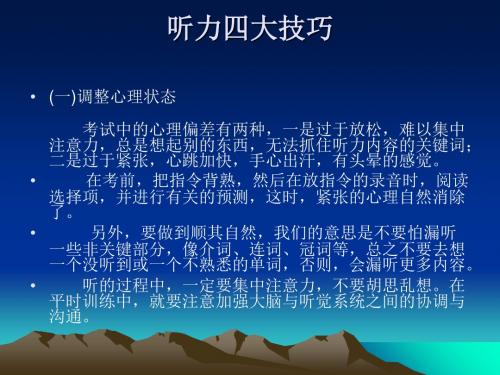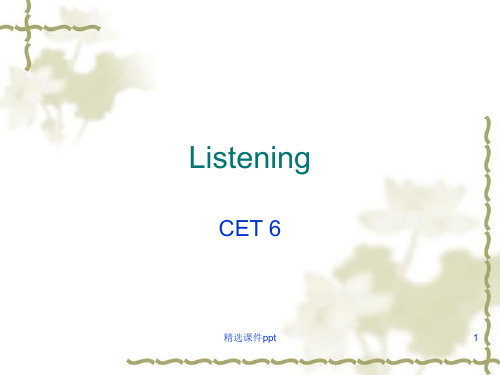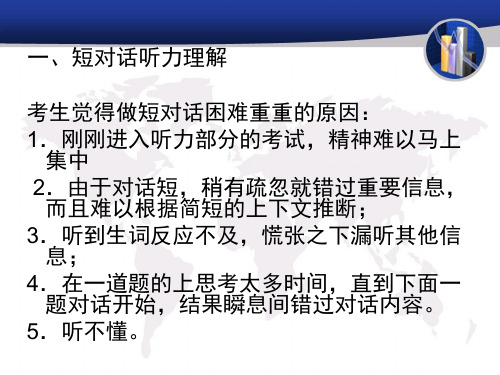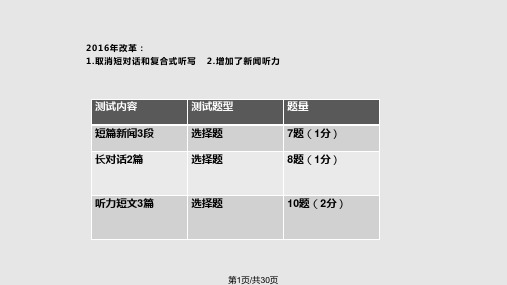四六级听力技巧(新题型)PPT精选文档
英语四六级听力技巧-PPT课件

(四)快速浏览选项
• 切记,对付一切听力考试都行之有效的做法是快速浏览选 择项并提炼信息点,再找出选项间的联系点。 • 当录音人在即将开始读Directions时,这就是你阅读选择 项的最佳时机。应充分抓住这段时间,速读选项,预测内 容,从而做到心中有数。 • 通过阅读,应明确以下信息: • a) 题目所涉及到的主要人物,地点等,如是场景类考题, 应迅速联想起与该场景有关的词汇,全神贯注地倾听相关 信息。 • b) 一般四个选择项的设计都会和录音内容或多或少地有点 关系,以使能够造成干扰。这时,你就要比较它们之间的 联系点,大胆地进行猜想,事先得到一个印象,再与听力 材料结合,就会迅速找出答案。
• 这一技巧是建立在考生有较强的阅读能力的基础上。当考 生具有这一能力时,通过在播放录音前的短暂时间里对问 题所设的选择项的涉及内容快速地通览一下,掌握其大意。 这样,你就会有针对性,目的性地去注意听力材料中提供 的信息。从而迅速地找出有效词句来,作出正确判断。 例如: 选项:A) The doctor is busy tomorrow. B) The doctor won’t see her tomorrow.
听力四大技巧
• (一)调整心理状态
考试中的心理偏差有关键词; 二是过于紧张,心跳加快,手心出汗,有头晕的感觉。 • 在考前,把指令背熟,然后在放指令的录音时,阅读 选择项,并进行有关的预测,这时,紧张的心理自然消除 了。 • 另外,要做到顺其自然,我们的意思是不要怕漏听 一些非关键部分,像介词、连词、冠词等,总之不要去想 一个没听到或一个不熟悉的单词,否则,会漏听更多内容。 • 听的过程中,一定要集中注意力,不要胡思乱想。在 平时训练中,就要注意加强大脑与听觉系统之间的协调与 沟通。
• 在section B中,一篇短文被连续地读出来, 这时记录关键信息就显得尤为重要。只有 你准确地记下了有关信息,才能顺利地完 成后面的题目。 • 怎样记?记什么?我们说速记,简记;记要 点,记关键词。简单到什么程度,只要是 自己能看懂,能为做题服务就足够了,记 的要点包括中心思想、主要人物、主要情 节,有关的地点、时间、数字(要准确)等。
大学英语四六级考试辅导讲座_PPT

五、大学英语四六级考试备考指南
四级时间段
六级时间段
主要任务
备考指南
8:50—9: 00
9:00—9: 10
14:50—15: 00
试音时间 认真试音,进入考试状态。
15:00—15: 10
播放考场指 令,发放作
文考卷
听取考试注意事项,把心态调整 到最佳状态。
9:10—9: 15:10—15:
40
40
14年6月的作文,四六估计还是漫画,六级估计还是引言, 但是最重要的第一点是:别把题目看走眼,你可能就已经成功 了一半。比如12年12月的四级作文题:Education pays, 渣渣 们都以为是教育花费,其实是:教育是有回报的。
2、 别急着动笔开始写,先花上1~2分钟来理解题目,因为作 文题目如何破解将决定接下来文章的走势。
•
11:15 监考老师口头提示考生10分钟后结束考试
•
11:25 考试结束,监考老师收回试题册及答题卡2
• 大学英语六级考试流程
•
14:40 考生入场,核对听力调频并试音
•
15:00 下发考试材料
•
15:10 考试正式开始,考生开始作答作文
•
15:35 监考老师口头提醒5分钟后开始听力考试
•
15:40 听力考试开始,考生注意及时填涂答题卡1
•
16:10 听力考试结束,监考老师收回答题卡1
•
16:15 考试继续进行,考生完成阅读理解和翻译部分
•
17:15 监考老师口头提示考生10分钟后结束考试
•
17:25 考试结束,监考老师收回试题册及答题卡2[6]
四、大学英语四六级考试题型具体内容及分值:
大学英语四六级(cet-4、cet-6)听力技巧PPT

4
英语听力技巧总结:
1. indeed; actually;强调词是答案所在: 1). W: What do you think of the apple pie? I made it myself.
2.
M: Very delicious indeed. Even my mother's cannot match this.
❖ Q: What will the man most probably do?
❖
[A] Get some change from Jane [B] Use the woman's phone.
❖
[C] Go to look for a pay phone. [D] Pay for the phone call.
值500、标准差70的常模正精选态课件分pp。t ”
2
问题三:什么是机考?何时机考?
听力为基础的考题占了70%,剩下的30%是阅读; 1、 视频理解:分值25%; 2、 听力填空:分值10%; 3、 会话跟读:分值10%; 4、 阅读理解:传统阅读 选择题 20%,
快速阅读,题型判断、选择或填空,分值10%; 5、 语法句型:以视频和阅读材料为基础,回答语法问题,
精选课件ppt
5
3.否定即答案所在
ቤተ መጻሕፍቲ ባይዱ
1)M: Jessica, could you send this emails to all the club members?
❖ W: Sorry, the computer broke down this morning. I will send for you
❖ as soon as I have fixed.
大学英语四六级新题型听力考试说明及新题型听力样题

大学英语四六级听力考试说明原四六级听力题型一、四级听力试题的调整1.取消短对话2.取消短文听写3.新增短篇新闻(3段)其余测试内容不变。
2016年6月四级听力题型调整后四级听力部分的试题结构见下表:2016年6月四级听力短篇新闻的考试指令:Section ADirections: In this section, you will hear three news reports. At the end of each news report, you will hear two or three questions. Both the news report and the questions will be spoken only once. After you hear a question, you must choose the best answer from the four choices marked A), B), C) and D). Then mark the corresponding letter on Answer Sheet 1 with a single line through the centre.二、六级听力试题的调整1.取消短对话2.取消短文听写3.听力篇章调整为2篇(原3篇)4.新增讲座/讲话(3篇)其他测试内容不变。
2016年6月四级听力题型调整后六级听力部分的试题结构见下表:Section CDirections: In this section, you will hear recordings of lectures or talks followed by some questions. The recordings will be played only once.After you hear a question, you must choose the best answer from the four choices marked A), B), C) and D). Then mark the corresponding letter on Answer Sheet 1 with a single line through the centre.四级听力样题Questions 1 and 2 will be based on the following news item.Kenyan police say one person was killed and 26 injured in an explosion at a bus station in central Nairobi. The blast hit a bus about to set off for the Ugandan capital Kampala. Last July, the Somali group al-Shabab said it was behind the blasts in the Ugandan capital which killed more than 70 people. Will Ross reports from the Kenyan capital.The explosion happened beside a bus which was about to set off for an overnight journey from Nairobi to the Ugandan capital Kampala. Some eyewitnesses report that a bag was about to be loaded on board, but it exploded during a security check. Windows of the red bus were left smashed, and blood could be seen on the ground beside thevehicle. Just hours earlier, Uganda’s police chief had warned of possible Christmas-time attacks by Somali rebels.1. What is the news report mainly about?2. When did the incident occurQuestions 1 and 2 will be based on the following news item.Christmas-time attacks made by Somali rebels.B) An explosion at a bus station in central Nairobi.C) The killing of more than 70 Ugandans in Kampala.D) Blasts set off by a Somali group in Uganda’s capital.On Christmas Eve. C) During a security check.B) Just before midnight. D) In the small hours of the morning.Questions 3 and 4 will be based on the following news item.Woolworths is one of the best known names on th e British High Street. It’s been in business nearly a century. Many of its 800 stores are likely to close following the company’s decision to call in administrators after an attempt to sell the business for a token £1 failed.The company has huge debts. Th e immediate cause for the collapse has been Britain’s slide toward recession, which has cut into consumer spending. However, the business had been in trouble for years.Known for low-priced general goods, Woolworths has struggled in the face of competition from supermarkets expanding beyond groceries and a new generation of internet retailers.Many of the store group’s 25,000 employees are likely to lose their jobs. Some profitable areas such as the DVD publishing business will survive.3. What do we learn about Woolworths from the news report?4. What did Woolworths attempt to do recentlyQuestions 3 and 4 will be based on the following news item.3. A) It is likely to close many of its stores.B) It is known for the quality of its goods.C) It remains competitive in the recession.D) It will expand its online retail business.4. A) Expand its business beyond groceries.B) Fire 25,000 of its current employees.C) Cut its DVD publishing business.D) Sell the business for one pound.Questions 5 to 7 will be based on the following news item.Cairo is known for its overcrowded roads, irregular driving practices and shaky old vehicles, but also for its air pollution. In recent months, though, environmental studies indicate there have been signs of improvement. That’s due in part to the removal of many of the capital’s old-fashioned black and white taxis. Most of these dated back to the 1960s and 70s and were in a poor state of repair.After new legislation demanded their removal from the roads, a low interest loan scheme was set up with three Egyptian banks so drivers could buy new cars. The government pays about $900 for old ones to be discarded and advertising on the new vehicles helps cover repayments.The idea has proved popular with customers ― they can n ow travel in air-conditioned comfort and because the new cabs are metered, they don’t have to argue over fares. Banks and car manufacturers are glad for the extra business in tough economic times. As for the taxi drivers, most are delighted to be behind the wheel of new cars,although there have been a few complaints about switching from black and white toa plain white colour.5. What change took place in Cairo recently?6. What helped bring about the change?7. Why do customers no longer argue with new cab driversQuestions 5 to 7 will be based on the following news item.5. A) All taxis began to use meters.B) All taxis got air conditioning.C) Advertisements were allowed on taxis.D) Old taxis were replaced with new cabs.6. A) A low interest loan scheme. C) Taxi passengers’ complaints.B) Environmentalists’ protests. D) Permission for car advertising.7. A) There are no more irregular practices.B) All new cabs provide air-conditioning.C) New cabs are all equipped with meters.D) New legislation protects consumer rights.Section A1. B2. C3. A4. D5. D6. A7. C六级听力样题Now listen to the following recording and answer questions 16 to 19.Moderator (会议主持人):Hello Ladies and Gentleman, it gives me great pleasure to introduce our keynote speaker for today’s session, Dr. Howard Miller. Dr. Miller, Professor of Sociology at Washington University, has written numerous articles and books on the issues facing older Americans in our graying society for the past 15 years. Dr. Miller: Dr. Miller:Thank you for that introduction. Today, I’d like to preface my remarks with a story from my own life which I feel highlights the common concerns that bring us here together. Several years ago when my grandparents were well into their eighties, they were faced with the reality of no longer being able to adequately care for themselves. My grandfather spoke of his greatest fear, that of leaving the only home they had known for the past 60 years. Fighting back the tears, he spoke proudly of the fact that he had built their home from the ground up, and that he had pounded every nail and laid every brick in the process. The prospect of having to sell their home and give up their independence, and move into a retirement home was an extremely painful experience for them. It was, in my grandfather’s own words, like having a limb cut off. He exclaimed in a forceful manner that he felt he wasn’t impo rtant anymore. For them and some older Americans, their so-called “golden years” are at times not so pleasant, for this period can mean the decline of not only one’s health but the loss of identity and self-worth. In many societies, this self-identity is closely related with our social status, occupation, material possessions, or independence. Furthermore, we often live in societies that value what is “new” or in fashion, and our own usage of words in the English language is often a sign of bad news for older Americans. I mean how would your family react if you came home tonight exclaiming, “Hey, come to the living room and see the OLD black and white TV I brought!” Unfortunately, the word “old” calls to mind images of the need to replace or discard.Now, many of the lectures given at this conference have focused on the issues of pension reform, medical care, and the development of public facilities for senior citizens. And while these are vital issues that must be addressed, I’d like to focus my comments on an important issue that will affect the overall success of the other programs mentioned. This has to do with changing our perspectives on what it means to be a part of this group, and finding meaningful roles the elderly can play and should play in our societies.First of all, I’d like to talk about . . .16. What does the introduction say about Dr. Howard Miller’s articles and books?17. What is the greatest fear of Dr. Miller’s grandfather?18. What does Dr. Miller say the “golden years” can often me an?19. What is the focus of Dr. Miller’s speechNow listen to the following recording and answer questions 16 to 19.16. A) They investigate the retirement homes in America.B) They are on issues facing senior citizens in America.C) They describe the great pleasures of the golden years.D) They are filled with fond memories of his grandparents.17. A) The loss of the ability to take care of himself.B) The feeling of not being important any more.C) Being unable to find a good retirement home.D) Leaving the home he had lived in for 60 years.18. A) The loss of identity and self-worth.B) Fear of being replaced or discarded.C) Freedom from pressure and worldly cares.D) The possession of wealth and high respect.19. A) The urgency of pension reform.B) Medical care for senior citizens.C) Finding meaningful roles for the elderly in society.D) The development of public facilities for senior citizens.Now listen to the following recording and answer questions 20 to 22.20. A) It seriously impacts their physical and mental development.B) It has become a problem affecting global economic growth.C) It is a common problem found in underdeveloped countries.D) It is an issue often overlooked by parents in many countries.21. A) They will live longer. C) Theyget along well with people.B) They get better pay. D) Theydevelop much higher IQs.22. A) Appropriated funds to promote research of nutrient-rich foods.B) Encouraged breastfeeding for the first six months of a child’s life.C) Recruited volunteers to teach rural people about health and nutrition.D) Targeted hunger-relief programs at pregnant women and young children.Now listen to the following recording and answer questions 20 to 22.The 2010 Global Hunger Index report was released today by the International Food Policy Research Institute (IFPRI). It notes that, in recent years, experts have come to the conclusion that undernourishment between conception and a child’s second birthday can have serious and long-lasting impacts.Undernourishment during this approximately 1,000-day window can seriously check the growth and development of children and render them more likely to get sick and die than well-fed children. Preventing hunger allows children to develop both physically and mentally.Says IFPRI’s Marie Ruel, “They will be more likely to perform well in school. They will stay in school longer. And then at adulthood, IFPRI has actually demonstrated that children who were better nourished have higher wages, by a pretty large margin,by 46 percent.”Ruel says that means the productivity of a nation’s future generations depends in a large part on the first 1,000 days of life.“This is why we’re all on board in focusing on those thousand days to improve nutritio n. After that, the damage is done and is highly irreversible.”The data on nutrition and childhood development has been slowly coming together for decades. But Ruel says scientific consensus alone will not solve the problem. “It’s not enough that nutritionists know you have to intervene then, if we don’t have the politicians on board, and also the...people that implement [programs] in the field.”Ruel says there are encouraging signs that politicians and implementers are beginning to get on board. Many major donors and the United Nations are targeting hunger-relief programs at pregnant women and young children. They focus on improving diets or providing micro-food supplements. They improve access to pre-birth care and encourage exclusive breastfeeding for t he first six months of a child’s life. Ruel says in the 1980s Thailand was able to reduce child undernourishment by recruiting a large number of volunteers to travel the countryside teaching about health and nutrition.“They really did very active promoti on of diversity in the diet and good eating habits. So they were providing more food to people, but also educating people on how to use them, and also educating people on how to feed their young children.”Ruel says countries may take different approaches to reducing child undernutrition. But she says nations will not make progress fighting hunger and poverty until they begin to focus on those critical first thousand days.20. What is the experts’ conclusion regarding children’s undernourishment in their earliest days of life21. What does IFPRI’s Marie Ruel say about well-fed children in their adult life?22. What did Thailand do to reduce child undernourishment in the 1980sNow listen to the following recording and answer questions 23 to 25.I’d like to look at a vital aspect of e-commerce, and that is the nature of the product or service. There are certain products and services that are very suitable for selling online, and others that simply don’t work.Suitable products generally have a high value-to-weight ratio. Items such as CDs and DVDs are obvious examples. Books, although heavier and so more expensive to post, still have a high enough value-to-weight ratio, as the success of Amazon, which started off selling only books, shows. Laptop computers are another good product for selling online.Digital products, such as software, films and music, can be sold in a purely virtual environment. The goods are paid for by online transactions, and then downloaded onto the buyer’s computer. There are no postage or delivery costs, so prices can be kept low.Many successful virtual companies provide digital services, such as financial transactions, in the case of Paypal, or means of communication, as Skype does. The key to success here is providing an easy-to-use, reliable service. Do this and you can easily become the market leader, as Skype has proved.Products which are potentially embarrassing to buy also do well in the virtual environment. Some of the most profitable e-commerce companies are those selling sex-related products or services. For a similar reason, online gambling is highly popular.Products which are usually considered unsuitable for selling online include those that have a taste or smell component. Food, especially fresh food, falls into this category, along with perfume. Clothes and other items that need to be tried on such as diamond rings and gold necklaces are generally not suited to virtual retailing,and, of course, items with a low value-to-weight ratio.There are exceptions, though. Online grocery shopping has really taken off, with most major supermarkets offering the service. The inconvenience of not being able to see the food you are buying is outweighed by the time saved and convenience of having the goods delivered. Typical users of online supermarkets include the elderly, people who work long hours and those without their own transport.23 What is important to the success of an online store?24. What products are unsuitable for selling online?25. Who are more likely to buy groceries onlineNow listen to the following recording and answer questions 23 to 25.23. A) The guaranteed quality of its goods.B) The huge volume of its annual sales.C) The service it provides to its customers.D) The high value-to-weight ratio of its goods.24. A) Those having a taste or smell component.B) Products potentially embarrassing to buy.C) Those that require very careful handling.D) Services involving a personal element.25. A) Those who live in the virtual world.B) Those who have to work long hours.C) Those who are used to online transactions.D) Those who don’t mind paying a little more.Section C16. B 17. D18. A 19. C20. A21. B 22. C23. D 24. A25. B。
四级英语听力技巧讲解 PPT

• 3)请求建议题 • 例如: • M: It seems that we’ll have another fine day tomorrow. Let’s go to the seaside. • W: OK, but we’ll have to leave very early or else we’ll get caught in the traffic. • Q: What does the woman mean? • 女性虽然同意,但是还是提出了一个 建议。此题中but就是解题的题眼。 •
• 1.因果原则: 含有表示因果关系的词汇的句子, 命题的可能性很大,这些词汇包括because, why, reason, so, as a result, as a sign of, thanks to, therefore, due to等等。 • 2.转折原则: 含有表示转折关系的词汇的句子, 命题的可能性很大,这些词汇包括but, however, whereas, otherwise, unfortunately, yet等等。 • 3.首末句原则: 对于B部分的大多数文章来讲, 首句和末句都很重要,出题的可能性很大,有 30%的段子题题目的答案,可以通过首末句得出。
• 5.其他 • 根据经验,如果对话情景是一个人邀请另一个人去看 电影或者去公园等,对方的回答一般是不会去。而给出的 最常见的理由就是:学习忙,或者有论文要写。 • 在没有把握的情况下,另一个技巧就是根据常识来排 除选项。比如,一般四级听力中说话人给的建议都是比较 积极的,如果选项中出现这样的建议——不要跟她说话或 者放弃这个计划——类似消极的建议,一般都不是正确的 答案。
• 短对话包括明示题和暗示题。所谓明示题 就是可以直接在所听内容中听到答案的; 暗示题是指对话中没有直接说明答案,需 要根据内容做一些推测、计算等。四级考 试中暗示题是占大部分,但是仍然会出现 少量明示题。而对于占绝大部分比重的暗 示题可以按照问题类型又分为地点、关系 和职业、数字计算、短语、条件、因果、 请求建议、观点态度、话题主旨、推断判 断等等。
大学英语四级听力技巧与策略ppt

一、.同学们最担心的是听力选 项的预览时间,从表中可以看出, 在9:55-10:00之间收答题卡一 和最后试音时间时可以预览听力部 分的选项,建议考生要充分利用这 段时间扫描passage部分的选项, 弄清三篇文章的主题,至于短对话 第一题的四个选项在播音前6秒看还 来得及。
二、注意听力测试三个 section前没有指令,直接 播放题目,这与旧四级听 力完全不同,考生听时需 要集中注意力,不要错过 重要的信息点。
• Had he realized the possible consequences, he wouldn’t have made the suggestion at the committee meeting last week .
• 二、数字题型
• 技巧:听到的数字通常不是正确 答案。
• 通常要了解时间、日期、价钱、号 码、航班等数字的不同读法。
• 缩读的原则: • 1、绝对不会是重点音节,不可
以重读
• 2、只能出现在非正式场合
do you----dy’a : how dy’a feel now? How dy’a like the movie? did you---dja: how dja make it? because—cause: I don’t like her cause she’s mean. can---cn: I can be there in an hour. I can do a lot of things that other people can not do it. give me : Gimme that! going to ---gonna. Want to ---Wanna got to---gotta: I gotta see him right now. He’s sort of a strange. ---He’s sorta strange. It ‘s kind of a tough. ---It’s kinda tough. probably---prob’ly: He’ll prob’ly come for dinner. currently---
大学英语6级听力技巧.ppt

of them.
Q: How does the man feel about the interview?
题型特点: 通过两个人的对话,判断他们要干什么或正 在做什么。
问题: What's the speaker doing now? What's the speaker going to do? What does the speaker think sb. should
M: Mary is in charge of the art and music section; and Charles, the sports page.
What about you?
W: I'm responsible for the editorials. Q: Where does the woman work?
M: This is ridiculous! I've been waiting for my meal for more than half an hour.
W: I know. But you see, the restaurant is full and we are short-handed today.
问题:
What does the speaker think of sth.?
What's the speaker's idea / attitude / opinion about ...?/ response to ...?
A) He is curious. B) He is impatient. C) He is exhausted. D) He is satisfied.
大学英语四六级新题型听力考试说明及新题型听力样题

大学英语四六级听力考试说明一、四级听力试题的调整1.取消短对话2.取消短文听写3.新增短篇新闻(3段)其余测试内容不变。
2016年6月四级听力题型调整后四级听力部分的试题结构见下表:2016年6月四级听力短篇新闻的考试指令:Section ADirections: In this section, you will hear three news reports. At the end of each news report, you will hear two or three questions. Both the news report and the questions will be spoken only once. After you hear a question, you must choose the best answer from the four choices marked A), B), C) and D). Then mark the corresponding letter on Answer Sheet 1 with a single line through the centre.二、六级听力试题的调整1.取消短对话2.取消短文听写3.听力篇章调整为2篇(原3篇)4.新增讲座/讲话(3篇)Section CDirections: In this section, you will hear recordings of lectures or talks followed by some questions. The recordings will be played only once. After you hear a question, you must choose the best answer from the four choices marked A), B), C) and D). Then mark the corresponding letter on Answer Sheet 1 with a single line through the centre.四级听力样题Questions 1 and 2 will be based on the following news item.Kenyan police say one person was killed and 26 injured in an explosion at a bus station in central Nairobi. The blast hit a bus about to set off for the Ugandan capital Kampala. Last July, the Somali group al-Shabab said it was behind the blasts in the Ugandan capital which killed more than 70 people. Will Ross reports from the Kenyan capital.The explosion happened beside a bus which was about to set off for an overnight journey from Nairobi to the Ugandan capital Kampala. Some eyewitnesses report that a bag was about to be loaded on board, but it exploded during a security check. Windows of the red bus were left smashed, and blood could be seen on the ground beside the vehicle. Just hours earlier, Uganda’s police chief had warned of possible Christmas-time attacks by Somali rebels.1. What is the news report mainly about?2. When did the incident occur?Questions 1 and 2 will be based on the following news item.1.A) Christmas-time attacks made by Somali rebels.B) An explosion at a bus station in central Nairobi.C) The killing of more than 70 Ugandans in Kampala.D) Blasts set off by a Somali group in Uganda’s capital.2.A) On Christmas Eve. C) During a security check.B) Just before midnight. D) In the small hours of the morning.Questions 3 and 4 will be based on the following news item.Woolworths is one of the best known names on the British High Street. It’s been in business nearly a century. Many of its 800 stores are likely to close following the compan y’s decision to call in administrators after an attempt to sell the business for a token £1 failed.The company has huge debts. The immediate cause for the collapse has been Britain’s slide toward recession, which has cut into consumer spending. However, the business had been in trouble for years.Known for low-priced general goods, Woolworths has struggled in the face of competition from supermarkets expanding beyond groceries and a new generation of internet retailers.Many of the store group’s 25,000 em ployees are likely to lose their jobs. Some profitable areas such as the DVD publishing business will survive.3. What do we learn about Woolworths from the news report?4. What did Woolworths attempt to do recently?Questions 3 and 4 will be based on the following news item.3. A) It is likely to close many of its stores.B) It is known for the quality of its goods.C) It remains competitive in the recession.D) It will expand its online retail business.4. A) Expand its business beyond groceries.B) Fire 25,000 of its current employees.C) Cut its DVD publishing business.D) Sell the business for one pound.Questions 5 to 7 will be based on the following news item.Cairo is known for its overcrowded roads, irregular driving practices and shaky old vehicles, but also for its air pollution. In recent months, though, environmental studies indicate there have been signs of improvement. That’s due in part to the removal of many of the capital’s old-fashioned black and white taxis. Most of these dated back to the 1960s and 70s and were in a poor state of repair.After new legislation demanded their removal from the roads, a low interest loan scheme was set up with three Egyptian banks so drivers could buy new cars. The government pays about $900 for old ones to be discarded and advertising on the new vehicles helps cover repayments.The idea has proved popular with customers ― they can now travel in air-conditioned comfort and because the new cabs are metered, they don’t have to argue over fares. Banks and car manufacturers are glad for the extra business in tough economic times. As for the taxi drivers, most are delighted to be behind the wheel of new cars, although there have been a few complaints about switching from black and white to a plain white colour.5. What change took place in Cairo recently?6. What helped bring about the change?7. Why do customers no longer argue with new cab drivers?Questions 5 to 7 will be based on the following news item.5. A) All taxis began to use meters.B) All taxis got air conditioning.C) Advertisements were allowed on taxis.D) Old taxis were replaced with new cabs.6. A) A low interest loan scheme. C) Taxi passengers’ complaints.B) Environmentalists’ protests. D) Permission for car advertising.7. A) There are no more irregular practices.B) All new cabs provide air-conditioning.C) New cabs are all equipped with meters.D) New legislation protects consumer rights.Section A1. B2. C3. A4. D5. D6. A7. C六级听力样题Now listen to the following recording and answer questions 16 to 19.Moderator (会议主持人):Hello Ladies and Gentleman, it gives me great pleasure to introduce our keynote speaker for today’s session, Dr. Howard Miller. Dr. Miller, Professor of Sociology at Washington University, has written numerous articles and books on the issues facing older Americans in our graying society for the past 15 years. Dr. Miller:Dr. Miller:Thank yo u for that introduction. Today, I’d like to preface my remarks with a story from my own life which I feel highlights the common concerns that bring us here together. Several years ago when my grandparents were well into their eighties, they were faced with the reality of no longer being able to adequately care for themselves. My grandfather spoke of his greatest fear, that ofleaving the only home they had known for the past 60 years. Fighting back the tears, he spoke proudly of the fact that he had built their home from the ground up, and that he had pounded every nail and laid every brick in the process. The prospect of having to sell their home and give up their independence, and move into a retirement home was an extremely painful experience for them. It was, in my grandfather’s own words, like having a limb cut off. He exclaimed in a forceful manner that he felt he wasn’t important anymore.For them and some older Americans, their so-called “golden years” are at times not so pleasant, for this period can mean the decline of not only one’s health but the loss of identity and self-worth. In many societies, this self-identity is closely related with our social status, occupation, material possessio ns, or independence. Furthermore, we often live in societies that value what is “new” or in fashion, and our own usage of words in the English language is often a sign of bad news for older Americans. I mean how would your family react if you came home tonight exclaiming, “Hey, come to the living room and see the OLD black and white TV I brought!” Unfortunately, the word “old” calls to mind images of the need to replace or discard.Now, many of the lectures given at this conference have focused on the issues of pension reform, medical care, and the development of public facilities for senior citizens. And while these are vital issues that must be addressed, I’d like to focus my comments on an important issue that will affect the overall success of the other programs mentioned. This has to do with changing our perspectives on what it means to be a part of this group, and finding meaningful roles the elderly can play and should play in our societies.First of all, I’d like to talk about . . .16. What does the introduction say about Dr. Howard Miller’s articles and books?17. What is the greatest fear of Dr. Miller’s grandfather?18. What do es Dr. Miller say the “golden years” can often mean?19. What is the focus of Dr. Miller’s speech?Now listen to the following recording and answer questions 16 to 19.16. A) They investigate the retirement homes in America.B) They are on issues facing senior citizens in America.C) They describe the great pleasures of the golden years.D) They are filled with fond memories of his grandparents.17. A) The loss of the ability to take care of himself.B) The feeling of not being important any more.C) Being unable to find a good retirement home.D) Leaving the home he had lived in for 60 years.18. A) The loss of identity and self-worth.B) Fear of being replaced or discarded.C) Freedom from pressure and worldly cares.D) The possession of wealth and high respect.19. A) The urgency of pension reform.B) Medical care for senior citizens.C) Finding meaningful roles for the elderly in society.D) The development of public facilities for senior citizens.Now listen to the following recording and answer questions 20 to 22.20. A) It seriously impacts their physical and mental development.B) It has become a problem affecting global economic growth.C) It is a common problem found in underdeveloped countries.D) It is an issue often overlooked by parents in many countries.21. A) They will live longer. C) They get along well with people.B) They get better pay. D) They develop much higher IQs.22. A) Appropriated funds to promote research of nutrient-rich foods.B) Encouraged breastfeeding for the first six months of a child’s life.C) Recruited volunteers to teach rural people about health and nutrition.D) Targeted hunger-relief programs at pregnant women and young children.Now listen to the following recording and answer questions 20 to 22.The 2010 Global Hunger Index report was released today by the International Food Policy Research Institute (IFPRI). It notes that, in recent years, experts have come to the conclusion that undernourishment between conception and a child’s second birthday c an have serious andlong-lasting impacts.Undernourishment during this approximately 1,000-day window can seriously check the growth and development of children and render them more likely to get sick and die than well-fed children. Preventing hunger allows children to develop both physically and mentally.Says IFPRI’s Marie Ruel, “They will be more likely to perform well in school. They will stay in school longer. And then at adulthood, IFPRI has actually demonstrated that children who were better nouris hed have higher wages, by a pretty large margin, by 46 percent.”Ruel says that means the productivity of a nation’s future generations depends in a large part on the first 1,000 days of life.“This is why we’re all on board in focusing on those thousand d ays to improve nutrition. After that, the damage is done and is highly irreversible.”The data on nutrition and childhood development has been slowly coming together for decades. But Ruel says scientific consensus alone will not solve the problem.“It’s not enough that nutritionists know you have to intervene then, if we don’t have the politicians on board, and also the...people that implement [programs] in the field.”Ruel says there are encouraging signs that politicians and implementers are beginning to get on board. Many major donors and the United Nations are targeting hunger-relief programs at pregnant women and young children. They focus on improving diets or providing micro-food supplements. They improve access to pre-birth care and encourage exclusive breastfeeding for the first six months of a child’s life.Ruel says in the 1980s Thailand was able to reduce child undernourishment by recruiting a large number of volunteers to travel the countryside teaching about health and nutrition.“They really did very active promotion of diversity in the diet and good eating habits. So they were providing more food to people, but also educating people on how to use them, and also educating people on how to feed their young children.”Ruel says countries may take different approaches to reducing child undernutrition. But she says nations will not make progress fighting hunger and poverty until they begin to focus on those critical first thousand days.20. What is the experts’ conclusion regarding children’s under nourishment in their earliest days of life?21. What does IFPRI’s Marie Ruel say about well-fed children in their adult life?22. What did Thailand do to reduce child undernourishment in the 1980s?Now listen to the following recording and answer questions 23 to 25.I’d like to look at a vital aspect of e-commerce, and that is the nature of the product or service. There are certain products and services that are very suitable for selling online, and others that simply don’t work.Suitable products generally have a high value-to-weight ratio. Items such as CDs and DVDs are obvious examples. Books, although heavier and so more expensive to post, still have a high enough value-to-weight ratio, as the success of Amazon, which started off selling only books, shows. Laptop computers are another good product for selling online.Digital products, such as software, films and music, can be sold in a purely virtual environment. The goods are paid for by online transactions, and then downloaded onto the buyer’s computer. There are no postage or delivery costs, so prices can be kept low.Many successful virtual companies provide digital services, such as financial transactions, in the case of Paypal, or means of communication, as Skype does. The key to success here is providing an easy-to-use, reliable service. Do this and you can easily become the market leader, as Skype has proved.Products which are potentially embarrassing to buy also do well in the virtual environment. Some of the most profitable e-commerce companies are those selling sex-related products or services. For a similar reason, online gambling is highly popular.Products which are usually considered unsuitable for selling online include those that have a taste or smell component. Food, especially fresh food, falls into this category, along with perfume. Clothes and other items that need to be tried on such as diamond rings and gold necklaces are generally not suited to virtual retailing, and, of course, items with a low value-to-weight ratio. There are exceptions, though. Online grocery shopping has really taken off, with most major supermarkets offering the service. The inconvenience of not being able to see the food you are buying is outweighed by the time saved and convenience of having the goods delivered. Typical users of online supermarkets include the elderly, people who work long hours and those without their own transport.23 What is important to the success of an online store?24. What products are unsuitable for selling online?25. Who are more likely to buy groceries online?Now listen to the following recording and answer questions 23 to 25.23. A) The guaranteed quality of its goods.B) The huge volume of its annual sales.C) The service it provides to its customers.D) The high value-to-weight ratio of its goods.24. A) Those having a taste or smell component.B) Products potentially embarrassing to buy.C) Those that require very careful handling.D) Services involving a personal element.25. A) Those who live in the virtual world.B) Those who have to work long hours.C) Those who are used to online transactions.D) Those who don’t mind paying a little more.Section C16. B 17. D 18. A 19. C 20. A 21. B 22. C 23. D 24. A 25. B。
四级专项听力解题技巧PPT课件

(3) 对错判断题
• Which of the following is not mentioned?
• 听到这类题时,一定要听清提问,对 于有没有not一词要弄清楚。一般情况 下,not一词会重读。
第24页/共30页
(4) 推理推测题
• What can be infer from the passage? • 做这类题时一定要注意与短文内容一样
time
第9页/共30页
第10页/共30页
一.对话
(一)短对话听力的原则
1. 推理原则:一般需对对话进行推理,故直接在对话中 听到的一般不是正确答案。 2. 挫折原则:通常要办的事情都是不顺利的(如买东 西买不到,订房间客满,租房脏乱吵等) 3. 男女原则:一般男生比较衰,女生比较牛。男生提 出的观点女生都是不同意或有不同看法的,反之女生提 出的观点男生都是同意和赞赏的。 男生的特征:脏、乱、差、浪费、穷、小气、不良习惯 等 女生的特征:爱干净、节约、富有、好学、能干、聪明、 大度、耐心、除数理化外成绩都很好
第16页/共30页
• W:I really need to get in touch with Professor Nelson. I have got a chemistry problem I can’t solve. But there are always students in his office.
for half price. • W: I'm afraid you wasted your money, yours is the first edition,
but we're supposed to be using the third edition. • Q: What has the man done? •
大学英语四六级听力精品PPT课件

❖ W: Yes, I have. It's on the second floor. Would you like to have a look? Come this way, please.
短对话
这部分包括8 个短对话,通常是一男一女各读一句, 然后提出一个问题;
可归纳为以下七种类型:
❖
一、数字型(numbers) : 主要包括询问时间、日期、价格、电话号
码、街道号码、房间号码以及人与物的数量等。
❖
1)询问时间有以下几种问法:
❖
1. What time is it now ? 2. What’s the time by your
❖ 二、职业型(occupations or professions) : ❖ 询问人的职业通常有以下几种类型:
❖ 1. Who is the man/ woman ?
❖ 2. What is the man/ woman ? ❖ 3. What is the man’s occupation/ profession ?
a quarter (to/past), half (past), daily, weekly, fortnight等。
❖
W: Bob, are you going straight home after school today?
❖
M: No. I have a class until one o'clock, and after that I'm
四六级听力技巧(新题型)ppt课件

四六级听力技巧
2021/4/8
1
I. 长对话题型及应试技巧
• 1. 读题技巧 • 1) 主动出击,在听音前快速浏览选项 • 2)选项较短时,通过扫视阅读了解问题 • 3)选项较长时,要善于发现各选项间的共同成分,着重理解其区别。
2021/4/8
2
II. 短文听力答题技巧
• 1. 浏览选项,积极预测 • 在听的时候更容易分清主次,有的放矢,记住与问题相关的信息。 • 2.全神贯注,把握整体。 • 若听的材料为记叙文,要留心其中的人物、事件、时间、地点等。 • 若是说明文,要特别注意开头、结尾、说明的对象及与选项有关的内容。
• 第二遍,记为主、听为辅。重点是抓紧时间,写下单词,长单词或词组可以用笔记先 记下。
• 第三遍,查漏补缺。根据空格上下文,从语法上进一步确定词性、单复数、分词等形 式。
2021/4/8
7
技巧3:熟记词组搭配
• 新题型会对词组进行考查,而录音往往会有连读、爆破等语音现象出现。因此考生平 时要注意积累一些常用的固定搭配,尤其是搭配中所含的介词。
2021/4/8
3
• 3.边听边记,对应信息。 • 做笔记,用自己熟悉的形式把关键信息、数字等迅速记录下来。 • 4. 调整方向,作出取舍。 • 遇到不会的难题,果断放弃,猜一个答案,然后集中精力做下一道题目。
4/8
4
III. 短文听写应试技巧(新题型)
• 原复合式听写调整为单词及词组听写,短文长度及难度不变,约为一篇240-260词左 右的短文。要求考生在听懂短文的基础上,用所听到的原文填写空缺的单词或词组, 共10题,短文播放三遍。
2021/4/8
8
IV.听音技巧
• 全神贯注 • 听音时,注意以下几点: • 1.开头部分引入对话,结尾总结对话。 • 2. 长对话有基本套路,往往其中一人总是发问,另一个人总是回答。
《六级听力技巧》PPT课件

Profession:clerk, shop assistant Relationship:Clerk/Shop assistant & Customer
整理ppt
15
4) Railway Station:platform, train, single ticket, return ticket
Hospital/Clinic: prescription, symptom, temperature, cold, fever, stomachache, pain, trouble (Doctor和patient)
整理ppt
8
Restaurant: menu, soup, drink, beverage, dish, beef, chicken, order, fill (customer和waiter)
What’s the matter?/What’s wrong with you? Let me give you an examination first.
Profession:doctor, nurse Relationship:Doctor/Nurse & Patient
整理ppt
14
How long can I keep it? You can keep the book for two weeks. Do you have the book…? Can you tell me where I can find…?
Profession:librarian, assistant Relationship:Librarian/Assistant &
Where does this conversation most likely occur?
CET6 听力技巧 PPT课件

人物关系题
• 人物关系题
• 选项特点:X and X • Interviewer and interviewee • Employer and employee • Doctor and patient • Customer and waiter/waitress • Receptionist and customer • Landlord and tenant
解释原因
• 解释原因
• Because (of) • As the result • Due to For • So…that • For this reason • Accordingly • As a consequence
Since
新闻听力
• 09年6月首次出现新闻听力题型,一 共出现两次(未来应当较为常见)。
掌握节奏,按部就班地做好答题准备,就 相当于拥有双倍的答题时间!
• 考生在录音人开始阅读 Directions时,快速阅读Section A各题选项 (Section B),等到Directions即将读完迅速回到 开头第一题,集中精力再 浏览一遍第一题的四个选项。这时候应该正好开始播放考题。这就是听 力考试开头应有的节奏。
Cultural Organization • WTO World Trade Organization • EU European Union • IMF International Monetary Fund • UNEP United Nations Environment Programme • GPO Green Peace Organization
• 转折典型词汇:But, however, yet, nevertheless, while, in fact, except for.
六级听力技巧PPT课件

4
• 6)建议及请求题:一方提供帮助或提出某种请求, 而另一方做出肯定或否定的反应。
• 7)词汇与习语题:主要考考生对某个单词的理解 • 8)逻辑推理题:对对话中出现的一些细节进行提
问,或者要求考生通过所听到的细节进行推理。 • 9)转折题:对话中含有“but” ”however”等转折的
词。 • 10)重复反问题:对一方的话先以反问的口气重复,
六级听力
1
整体概况
+ 概况1
您的内容打在这里,或者通过复制您的文本后。
概况2
+ 您的内容打在这里,或者通过复制您的文本后。
概况3
+ 您的内容打在这里,或者通过复制您的文本后。 2
听力部分备战策略
• 听力对话和篇章, 心理状态是基础, • 中间间隔是保障, 提前预测是关键, • 发卷即可看选项, 尤其关注短对话, • 场景特征需牢记, 后者说话显重要, • 长对话题听发展, 起承转合是关键, • 篇章听力难度高, 只听大意可通过, • 抓住选项关键词, 全神贯注做笔记, • 复合听写考什么, 速记能力和拼写, • 平时需要常练习, 所有技巧靠基础。
• Bank: account, cash, check, deposit, savings (Bank clerk 和customer)
• Hospital/Clinic: prescription, symptom, temperature, cold, fever, stomachache, pain, trouble (Doctor和patient)
M: Good evening, Madam. There is a table
6
• A. At the airport B. In a travel agency • C. In a hotel D. At the reception desk
- 1、下载文档前请自行甄别文档内容的完整性,平台不提供额外的编辑、内容补充、找答案等附加服务。
- 2、"仅部分预览"的文档,不可在线预览部分如存在完整性等问题,可反馈申请退款(可完整预览的文档不适用该条件!)。
- 3、如文档侵犯您的权益,请联系客服反馈,我们会尽快为您处理(人工客服工作时间:9:00-18:30)。
• 遇到不会的难题,果断放弃,猜一个答案, 然后集中精力做下一道题目。
26.11.2020
4
III. 短文听写应试技巧(新题型)
• 原复合式听写调整为单词及词组听写,短 文长度及难度不变,约为一篇240-260词左 右的短文。要求考生在听懂短文的基础上, 用所听到的原文填写空缺的单词或词组, 共10题,短文播放三遍。
26.11.2020
5
技巧1:听音前预读
• 听写材料录音播放之前会有一段读 Directions的时间,这时,要尽快预读文字 材料,了解短文大意,同时可根据语法规 则猜测空格处要填入的词性及单复数、分 词等语法形式。
26.11.2020
6
技巧2:三遍听音,各有重点
• 第一遍,听为主、记为辅。重点是借助文 字材料,理解和把握全篇内容和脉络,顺 便填写有把握的单词和做笔记。
• 第二遍,记为主、听为辅。重点是抓紧时 间,写下单词,长单词或词组可以用笔记 先记下。
• 第三遍,查漏补缺。根据空格上下文,从 语法上进一步确定词性、单复数、分词等 形式。
26.11.2020
7
பைடு நூலகம்
技巧3:熟记词组搭配
• 新题型会对词组进行考查,而录音往往会 有连读、爆破等语音现象出现。因此考生 平时要注意积累一些常用的固定搭配,尤 其是搭配中所含的介词。
26.11.2020
8
IV.听音技巧
• 全神贯注 • 听音时,注意以下几点: • 1.开头部分引入对话,结尾总结对话。 • 2. 长对话有基本套路,往往其中一人总是
发问,另一个人总是回答。
26.11.2020
9
Thank you !
26.11.2020
10
• 在听的时候更容易分清主次,有的放矢, 记住与问题相关的信息。
• 2.全神贯注,把握整体。
• 若听的材料为记叙文,要留心其中的人物、 事件、时间、地点等。
• 若是说明文,要特别注意开头、结尾、说 明的对象及与选项有关的内容。
26.11.2020
3
• 3.边听边记,对应信息。
• 做笔记,用自己熟悉的形式把关键信息、 数字等迅速记录下来。
• 四六级听力技巧
26.11.2020
1
I. 长对话题型及应试技巧
• 1. 读题技巧 • 1) 主动出击,在听音前快速浏览选项 • 2)选项较短时,通过扫视阅读了解问题 • 3)选项较长时,要善于发现各选项间的共
同成分,着重理解其区别。
26.11.2020
2
II. 短文听力答题技巧
• 1. 浏览选项,积极预测
